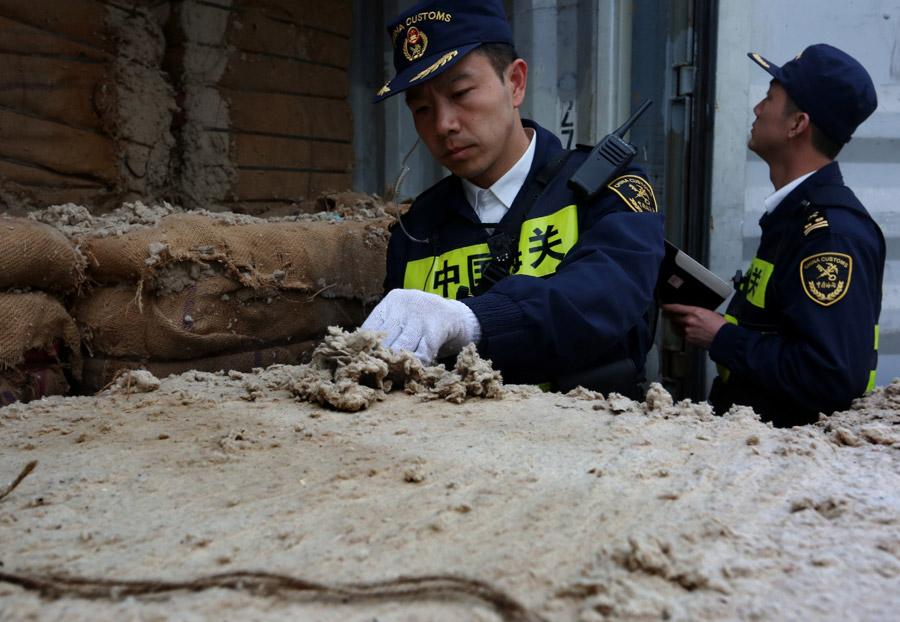 Customs officers check smuggled waste cotton in Qingdao, Shandong province, on June 11, 2018. [Photo by Zhang Jingang/For China Daily]
Customs officers check smuggled waste cotton in Qingdao, Shandong province, on June 11, 2018. [Photo by Zhang Jingang/For China Daily]
Operations succeed through close cooperation with agencies, countries
China Customs officers will continue to work with their international peers and various organizations to fight the smuggling of illegal solid waste, officials said at a news briefing on Tuesday in Shanghai.
An operation dubbed Demeter IV and initiated by China in March involved 15 international organizations, including the World Customs Organization, the United Nations Environment Programme, the International Criminal Police Organization, the Secretariat of the Basel Convention and 75 solid waste importing and exporting countries and regions.
During the 64-day operation from May 21 to July 23, all members worked together and effectively prevented smuggling by improving supervision, strengthening information exchanges and conducting joint investigations, which blocked, returned or seized 326,000 metric tons of solid waste, reported 214 illegal cases and issued 37 warnings, according to a news release from the WCO and the General Administration of Customs of China.
Chinese customs played a leading role in the operation, reporting 125 cases to the WCO, nearly 60 percent of all reported cases, according to the administration.
During the operation, China Customs officers also worked with 29 countries and regions on more than 40 solid-waste smuggling cases, blocked and returned nearly 75 tons of solid waste and arrested three major suspects.
Ni Yuefeng, minister of the customs administration, referred to the operation as "a pioneering success" in international collaboration.
"For the law enforcement departments, ecological environment protection is a long-term task," Ni said. "China Customs will continue to work with the international organizations and other member countries and regions to construct a prosperous, clean and beautiful world together."
Erik Solheim, undersecretary-general of the United Nations, said at the briefing: "Cross-border environmental crime is a massive criminal enterprise worth $260 billion a year and, sadly, every year it is growing. But this mission cannot be undertaken by any country alone, not China alone. Combating environmental crime across borders requires strong collaboration between countries."
More than 10 billion tons of solid waste is produced annually and a large amount flows to developing countries in Asia, Africa and Latin America through illegal channels and severely damages their economy, according to the WCO.
As illegal cross-border trafficking of solid waste is seriously damaging the balance of the global environment, the WCO organized 170 countries and regions in Asia, Africa and Europe in 2009 to carry out Operation Demeter I, in which China played an important role. The operation seized 8,927 tons of waste from Europe and the United States at 18 key ports, including Guangzhou, Shenzhen and Nanjing, according to the customs administration.
Later, in 2013, China Customs initiated the successful Operation Demeter III, which targeted illicit maritime consignments of hazardous waste and other waste transported from Europe and other regions to the Asia-Pacific.
In March, Chinese Customs initiated Operation Demeter IV, which focused mainly on the smuggling of solid waste as the government stepped up enforcement on a ban on solid waste imports.
Since the beginning of this year, the Chinese government has banned imports of 24 types of solid waste, including plastics and paper, and has imposed tough quality restrictions on other recyclable materials. The list will be extended to include 32 types of solid waste on Dec 31, according to a newly released document.
The newly added products include hardware, ships, auto parts and scrap stainless steel, titanium and wood.
(Source: China Daily)




 A single purchase
A single purchase









